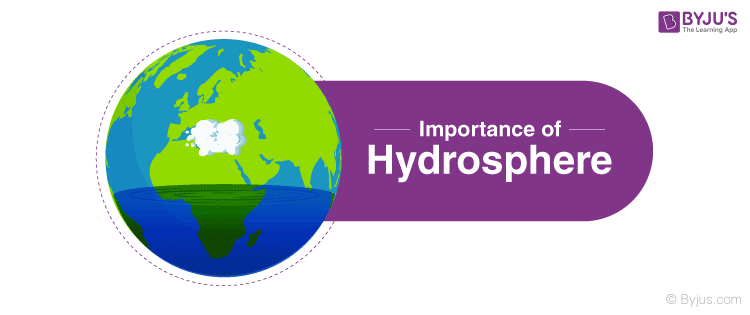
Have you ever thought about the quantity of water on Earth? According to studies, approximately 71% of the earth is covered with water. Water is found in oceans, lakes, rivers, and streams, and is stored underground as groundwater. Some amount is trapped in ice. Water also exists in the atmosphere in the form of water vapour. All the water that exists on Earth is known as Hydrosphere. Put differently; the hydrosphere is the water component of the Earth. Hence, we can define the hydrosphere as,
The total amount of water on a planet. It includes water on the surface of the planet, underground, and in the air. The hydrosphere of a planet might be liquid, vapour, or ice.
The hydrosphere is always in motion. The motion of rivers and streams can be seen, but the motion of water in ponds and lakes is less obvious. Some motion of seas and ocean can be seen easily with large scale motions that travel water with great distances like poles and tropics or between continents. These kinds of motions are in the form of currents that move warm water in the tropics towards the poles and cool water from the poles towards the tropics. These currents are present on the surface of the ocean and at depths in the ocean.
| Table of Contents |
Why is the Hydrosphere Important?
We rarely think about the role of the planet that keeps us alive and take the hydrosphere for granted. The major importance of the hydrosphere is that water sustains various life forms and plays an important role in ecosystems and regulating the atmosphere. Hydrosphere covers all water present on the Earth’s surface. It involves saltwater, freshwater, and frozen water, along with groundwater and water in the lower levels of the atmosphere. The following are the functions of a hydrosphere.
-
Water is the most important part of living cells
Every cell in a living organism is built up of about 75% of water, hence allowing the cell to function appropriately. Cells would not be able to carry out normal functions and life cannot exist without water.
-
Human needs
Humans use water in many ways. Drinking water is the most obvious use, but it is also used for domestic purposes like washing and cleaning and in industries. Water is also utilised in generating electricity through hydropower.
-
Water provides habitat
Hydrosphere provides a place for many plants and animals to live in. Many gasses like CO2, O2, nutrients like ammonium and nitrite(NO–2) as well as other ions are dissolved in water. The presence of these substances is essential for life to exist in water.
-
Regulate Climate
The water’s specific heat is its unique characteristic. This indicates that water takes a lot of time to heat up and a lot of time to cool down. It helps in regulating temperatures on earth as they stay in a range that is acceptable for life on earth to exist.
These are only a few of the functions that water plays on the planet. Many functions relate it to chemistry and methods in which it dissolves substances.
To know more about the importance of the biosphere and the importance of the lithosphere, you can visit us at BYJU’S.
Frequently Asked Questions – FAQs
Q1What is hydrosphere?
The hydrosphere is the total quantity of water on a planet. It includes water on the planet’s surface, underground, and in the atmosphere. The hydrosphere of a planet might be liquid, vapour, or ice.Q2What is lithosphere?
The entire volume of water on a planet is known as the hydrosphere. Water on the planet’s surface, underground, and in the atmosphere are all included. A planet’s hydrosphere may consist of liquid, vapour, or ice.Q3How many types of lithosphere are there?
There are two types of lithosphere:- Oceanic: Which is associated with oceanic crust and exists in the ocean basins.
- Continental: This is associated with continental crust.
Q4What is a hydrological cycle?
During the hydrological cycle, water is moved from one state or reservoir to another. Streams, seas, rivers, lakes, groundwater, underground aquifers, polar ice caps, and saturated soil are all examples of reservoirs. They also contain atmospheric moisture, such as snow, rain, and clouds.Q5Define atmosphere.
All life on Earth is shielded by the atmosphere, a layer of gaseous substances that regulates temperatures over a narrow range and deflects dangerous solar radiation.Test your knowledge on Importance of hydrosphereComments
Leave a Comment
-
-
-


This thing is so awesome